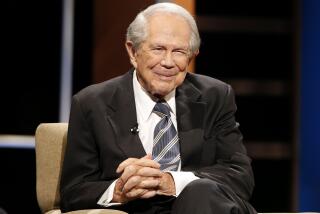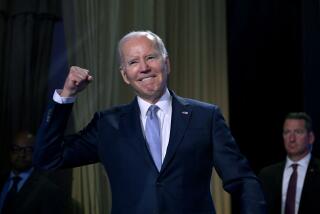Vows to Restore ‘Rule of Law, Respect for Truth’ : Gore Formally Enters Presidential Race
- Share via
CARTHAGE, Tenn. — Against the backdrop of the vintage county courthouse here in his rural Tennessee hometown, Sen. Albert Gore Jr. on Monday formally declared his candidacy for the 1988 Democratic presidential nomination, vowing to “restore the rule of law and respect for truth and common sense to the White House.”
Gore, 39, a Vietnam veteran and former divinity student, stressed his Southern roots and his youth. However, he added, as if in rebuttal to any suggestion that his campaign is strictly regional: “I am not running as a Southern candidate but as a national candidate from the South and proud of it.”
Gore, who has been an unofficial candidate since early April, is the sixth contender to formally join the wide-open Democratic presidential nomination fight. He is also the youngest.
In an allusion to the Iran- contra scandal plaguing the Reagan Administration, he said: “Americans in every region and in both political parties have been shaken by the betrayal of public trust, the theft of public money, the shredding of public documents and the dishonesty of public officials.”
He added that his first promise to voters is that, if elected, he would fire immediately “any government official who steals from the American people or lies to the United States Congress.”
More than 5,000 townspeople and well-wishers cheered Gore at the Smith County Courthouse, where he had also kicked off his 1984 Senate campaign and four consecutive House campaigns before that, beginning in 1976.
‘Just Like His Pappy’
“We think he’s just great, just like his pappy,” said silver-haired Nola McDonald of nearby Hermitage, referring to Gore’s father, Albert Gore, who spent 32 years on Capitol Hill, first as a congressman and then as a senator.
Gore was accompanied by his father and by his wife, Tipper, a national advocate for warning labels on rock music records with sexually explicit lyrics, and their four young children.
Gore is banking heavily on the March 8 Super Tuesday primaries and caucuses in more than a dozen Southern and border states next year.
However, the possibility of a presidential bid by Sen. Sam Nunn of neighboring Georgia casts a shadow over Gore’s campaign. Many Southern Democratic Party leaders view Nunn, a popular moderate conservative and a widely respected expert on military and foreign policy, as more electable than Gore, and they are withholding their backing until Nunn’s intentions are clear.
“There’s a lot of indecision in the South,” says Hastings Wyman Jr., publisher of the Southern Political Report, a Washington-based newsletter. “Nunn’s the big factor. But it’s also not clear that any one candidate would run better than any other in the South. Gore’s big asset is he could also do well with Democratic voters outside the South, which Nunn may not be able to do.”
To do well with voters outside the South, however, Gore must build up his name recognition. Recent polls taken in New Hampshire and Iowa, where the first contests of 1988 will be held, showed Gore with the support of 1% or less of registered Democrats.
Nationwide, according to an ABC News-Washington Post Poll of May 28-June 1, Gore had a scant 5% of the support, with 69% of those surveyed saying they did not know enough about him.
More to Read
Get the L.A. Times Politics newsletter
Deeply reported insights into legislation, politics and policy from Sacramento, Washington and beyond. In your inbox twice per week.
You may occasionally receive promotional content from the Los Angeles Times.










